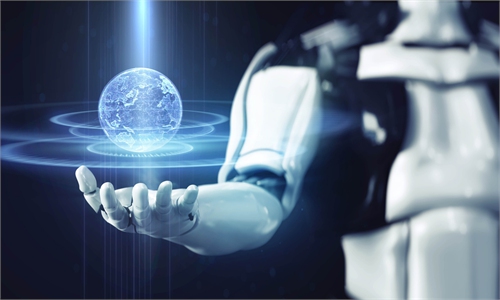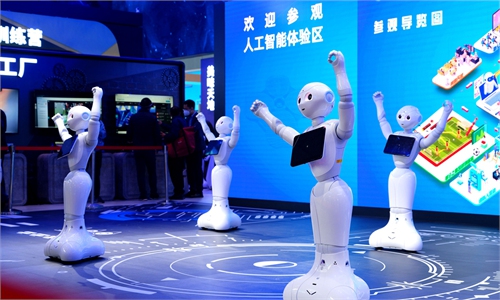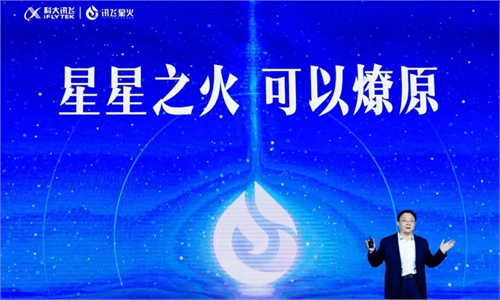OpenAI CEO calls for global cooperation on AI regulation, says ‘China has some of the best AI talent in the world’

Sam Altman, the CEO of OpenAI (right), delivers an online speech at the conference held by the Beijing Academy of Artificial Intelligence in Beijing on June 10, 2023. Photo: Shen Weiduo/GT
Sam Altman, the CEO of OpenAI, has called for a global cooperation in setting up the regulatory guardrails for powerful artificial intelligence (AI) systems at an industry forum held in Beijing on Saturday, noting that China can play a significant role with some of its "best AI talent in the world."
"China has some of the best AI talent in the world... given the difficulties solving alignment for advanced AI systems requires the best minds from around the world," Altman said at an industry forum hosted by the Beijing Academy of Artificial Intelligence (BAAI) on Saturday.
Altman predicted that in the next decade, artificial general intelligence systems, commonly called AGI, may surpass human expertise "in nearly every domain," and could eventually exceed the collective productivity of some of the largest companies.
"The potential upside here isn't one. AI revolution will create shared wealth and make it possible to dramatically improve the standard of living for everyone. We must manage the risk together in order to get there," Altman said.
At present, a new round of AI boom triggered by ChatGPT is sweeping the world including China. While people have been thrilled for the productivity improvement that AI can bring, they are increasingly aware of the huge risks, with governments slowly stepping in to harness the powerful yet dangerous tool.
In May, hundreds of industry leaders, including Altman himself, have signed a letter warning that "mitigating the risk of extinction from AI should be a global priority alongside other societal-scale risks such as pandemics and nuclear war." Altman made a point to reference the IAEA, the United Nations nuclear watchdog, as an example of how the world came together to oversee nuclear power.
"We need international cooperation to build global trust in the safe development of increasingly powerful AI systems. In a verifiable way, I have no illusions that this will be easy. We will need to devote significant and sustained attention as an international community to get this right," Altman said.
In a possible indication to the current geopolitical conflict's impact on the global AI cooperation, Altman noted that "great powers may have their share of differences." This is true today, as it has been before. But even during the most difficult times, great powers have found ways to cooperate on what matters. "We see great potential for researchers in the US, China, and around the world to work together to achieve the shared goal."
Altman used an ancient Chinese proverb, "a journey of a thousand miles begins with a single step," in describing how the world should start on the difficult but necessary cooperation.
In talking about the next frontier that OpenAI is engaging on in a later Q&A session, Altman said OpenAI is discussing about opening source more models in the future, but does not have a specific model or timetable.
"Certainly, at some point, we'll try to do a GPT-5 model in the sequence, but not anytime soon and we don't know exactly when," Sam said, adding that he's hoping someday the company can get to return to robotics - a sector the company has worked on at the very start.
The two-day conference hosted by the BAAI has invited leading figures in the industry such as AI "godfather" Geoffrey Hinton and Turing Award winner Yann André LeCun. Apart from exchanging on AI frontiers and technology progress, this year's conference placed a special focus on AI regulation and alignment.
Industry players and experts at the forum have also emphasized on the importance of global cooperation in harnessing the "double-sword" technology, which is especially urgent as the large models are development "too fast."
"We are fully aware of the urgency of AI regulation, but under the current global situation, as some in the US are hyping China threat with AI as a key battleground, global cooperation and an international rule could be hard, though some cooperation might be achievable in certain areas,"Wang Peng, a research fellow at the Beijing Academy of Social Sciences, told the Global Times on Saturday at the sidelines of the event.
Looking ahead, the development of large models and major technological breakthroughs is clearly be related to the life and death of human society, Wang said, noting that it's critical for some nations to drop closed and retrogressive minds of "small courtyards and high walls," join forces together with the rest of the world, and concentrate on overcoming difficulties for the benefit of all mankind.




